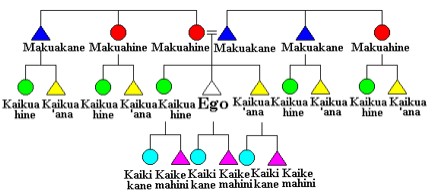I. What is kinship?
A. Social structure: blueprint for how society is set up
B. Kinship is:1. familyC. Kinship is culturally specific, cultural construction
2. social organization of reproductive activity
3. Radcliffe-Brown: system of relatedness by biology and marriage1. US: biological relatedness, "real" relativesD. Ways of making kinship in Euro-American culture
2. David Schneider and pigs in Yap1. birthE. Other ways of reckoning relatedness
2. adoption
3. marriage
4. fictive kin1. Patriliny in China
2. Matrinliny in Trobriand Islands
II. The Evolution of Family Systems
A. Tylor, Morgan, and kinship1. Every society has kinship
2. Morgan and the evolution of kinship systemsa. Kin Terms = conception of biological relatedness, represent system of marriage
b. Hawaiian kinshipc. Rank kinship systems on evolutionary scale
d. Notions of biological relatedness assumed to become more specific over time
e. Morgan's logical flaw: terminology doesn't equal conception of biological relatedness
III. Radcliffe-Brown and the comparison of kinship systems
A. Rejected Morgan's conjectural history
B. Kin terms = "best possible approach to the investigation of the kinship system as a whole" (62).1. Classificatory
2. English kinship = example of Eskimo system

a. lack of distinction between uncles3. Kinship terminology yields structural skeleton of society
b. distinction among close relatives
4. Problems with Radcliffe-Brown's approacha. primogeniture in English system
b. Need to study kinship system to know whether conceptions are reflected in terminology, can't deduce those conceptions from terminology alone
IV. Types of Kinship Systems
A. Family forms1. Nuclear (Inuit and US)B. Types of Descent
2. Extended
3. Polygamousa. polygyny
b. polyandry1. unilinealC. Residence patternsa. patrilineal2. bilateral
b. matrilineal1. virilocalD. China: extended, patrilineal, patrilocal
2. uxorilocal
3. neolocal
E. US: nuclear, bilateral, neolocal

